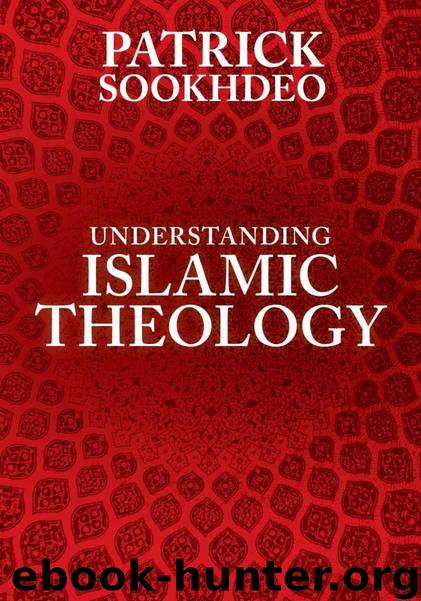Understanding Islamic Theology by Sookhdeo Patrick

Author:Sookhdeo, Patrick [Sookhdeo, Patrick]
Language: eng
Format: azw3, epub
Publisher: Isaac Publishing
Published: 2014-06-23T16:00:00+00:00
The Last Day
The Qur’an and hadith, in many passages, give a minute description of the resurrection, the last judgment, Paradise and hell. Both the Qur’an and the hadith literature present belief in the Last Day as equivalent to belief in Allah, especially since the pagan Meccans denied the hereafter, and this is linked to their polytheism in the Qur’an:
Surah 53 (Najm), ayah 27
27. Those who believe not in the Hereafter name the angels with female names.
On this Yusuf ‘Ali comments: ‘The Pagan Quraish had no firm belief in the Hereafter. Their prayers for intercession to angels and deities was on account of their worldly affairs.’ We should link this to their scoffing about the Day of Judgment. Hence, Muslims were distinguished from pagans by their belief in one God and in the Last Day. The circle of equivalence is made complete by the fact that Muhammad is supposedly the revelatory ‘Warner’ of this event:
Surah 2 (Baqara), ayah 8
8. Of the people there are some who say: ‘We believe in Allah and the Last Day’ but they do not (really) believe.
At an early point in Muhammad’s career, we can see that belief in the Last Day was a point of contact with Judaism and Christianity.417 The promise of eschatological reward for Muslims and ahl al-kitab (Christians and Jews) is paralleled by the threat of punishment for those who deny the reality of the Last Day.418 Islamic law says the following:
CONGREGATIONAL PRAYER: CHOICE OF IMAM…
… Abu Hurayrah reports that the Prophet said: ‘It is not allowed for a man who believes in Allah and the Last Day to be an imam for a people, except with their permission….’
As we have seen, the emphasis on the Last Day reflects Muhammad’s supposed role as a ‘prophetic warner’: the Day of Judgment is coming; people must prepare for it by submitting to Allah in Islam and believing that Muhammad is the divine Messenger.
Muhammad’s reputed role as ‘the Last Prophet’ is closely related to the belief in the Last Day; there are texts in both the Qur’an and the hadith that imply that he was of the conviction that the End would come soon (although admittedly in tension with others declaring that only God knows the time). If the Last Day was indeed imminent and one’s standing and eschatological destiny on that Day were decided on the basis of one’s response to the message of the ultimate prophetic Warner, we can see how Muhammad’s preaching would have possessed peculiar forcefulness in this regard. It would be similar to the biblical presentation of Jonah in Nineveh announcing the imminent destruction of the city for its wickedness. We should see Muhammad’s self-understanding of his role and message in this light.
Many of the signs of the End in Islam, such as cosmological and ecological disturbances etc., are the common aspects of apocalyptic eschatological systems in many religions; others are simply exaggerated forms of everyday life in the Arabian desert. Other aspects betray Christian influence in eschatological data, such as the prediction of the Antichrist and the second coming of Jesus.
Download
Understanding Islamic Theology by Sookhdeo Patrick.epub
This site does not store any files on its server. We only index and link to content provided by other sites. Please contact the content providers to delete copyright contents if any and email us, we'll remove relevant links or contents immediately.
| Hadith | History |
| Law | Mecca |
| Muhammed | Quran |
| Rituals & Practice | Shi'ism |
| Sufism | Sunnism |
| Theology | Women in Islam |
The History of Jihad: From Muhammad to ISIS by Spencer Robert(2631)
Nine Parts of Desire by Geraldine Brooks(2369)
The Turkish Psychedelic Explosion by Daniel Spicer(2360)
The First Muslim The Story of Muhammad by Lesley Hazleton(2275)
The Essential Rumi by Coleman Barks(2048)
1453 by Roger Crowley(2031)
The Last Mughal by William Dalrymple(1858)
Trickster Travels: A Sixteenth-Century Muslim Between Worlds by Davis Natalie Zemon(1848)
Muhammad: His Life Based on the Earliest Sources by Martin Lings(1649)
God by Aslan Reza(1644)
by Christianity & Islam(1636)
A Concise History of Sunnis and Shi'is by John McHugo(1569)
No God But God by Reza Aslan(1545)
Magic and Divination in Early Islam by Emilie Savage-Smith;(1534)
The Flight of the Intellectuals by Berman Paul(1503)
Nothing to Envy by Barbara Demick(1450)
Art of Betrayal by Gordon Corera(1431)
What the Qur'an Meant by Garry Wills(1395)
Getting Jesus Right: How Muslims Get Jesus and Islam Wrong by James A Beverley & Craig A Evans(1343)
